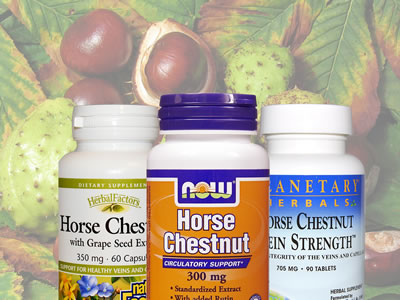Horse Chestnut (Aesculus hippocastanum) is one of European remedies for treating varicose veins, chronic venous insufficiency (CVI), hemorrhoids, swelling and other circulation related disorders.
Horse chestnut is a tree native to Europe. It can grow to 30-40 m tall. Horse chestnut seed extract is used as a supplement in Europe for treating venous and circulatory problems.
Uses of horse chestnut
Horse chestnut contains rich saponins and flavones. Studies have shown that flavones help regulate the functions of the vascular system and connective tissue. Scientists recommend people to increase dietary intake of flavonoid-rich foods and supplements to insure a healthy vascular system.
Horse chestnut seed extract has been used to treat varicose veins and other circulatory problems. Studies have shown that taking horse chestnut seed extract can reduce some symptoms of poor blood circulation, such as varicose veins, pain, tiredness, swelling in the legs, itching, and water retention.
Horse chestnut seed extract is said to help chronic venous insufficiency (CVI) – a condition in which the veins do not efficiently return blood from the legs to the heart. This disorder is associated with varicose veins, and with symptoms of pain, cramping, swelling, heavy-feeling and itching in legs. To treat CVI, doctors often use the conservative therapy that consists largely of compression treatment. But this therapy often causes discomfort and has been associated with poor compliance. Horse chestnut seed extract is an alternative treatment for CVI.
According to a study published in 2004, the researcher reviewed the evidence from rigorous clinical trials assessing the efficacy and safety of oral horse chestnut seed extract based on the randomised controlled trials (RCTs) of horse chestnut seed extract for chronic venous insufficiency. the researcher compared oral horse chestnut seed extract mono-preparations with placebo, or other treatments in patients with CVI. The study found that there appeared to be an improvement in symptoms related to CVI with horse chestnut seed extract compared with placebo. The evidence suggested that horse chestnut seed extract is an efficacious and safe short-term treatment for CVI.
In another study published in 2001, oral therapy with horse chestnut seeds extracts was shown to be superior to placebo in patients with early chronic venous insufficiency. The study suggested that horse chestnut seems to be a suitable and protecting therapy for the early stages of CVI.
Horse chestnut seed extract has also been used for relieving hemorrhoids, enlarged prostate, eczema, and swelling caused by bone fracture, sprains or arthritis.
Please note, raw horse chestnut is considered unsafe. It can lead to nausea, vomiting, diarrhea, headache, convulsions, or other severe conditions. Although the horse chestnut products have the toxic component removed and have being widely used in Europe, but you should still be cautious before using it. For people who have kidney or liver disease and bleeding disorders, such as low blood sugar, or bleeding, horse chestnut should be avoided. You should consult your doctor before using horse chestnut.
References
- Horse chestnut seed extract for chronic venous insufficiency, Cochrane Database Syst Rev. 2004.
- Rational therapy of chronic venous insufficiency – chances and limits of the therapeutic use of horse chestnut seeds extract, BMC Cardiovasc Disord. 2001.



